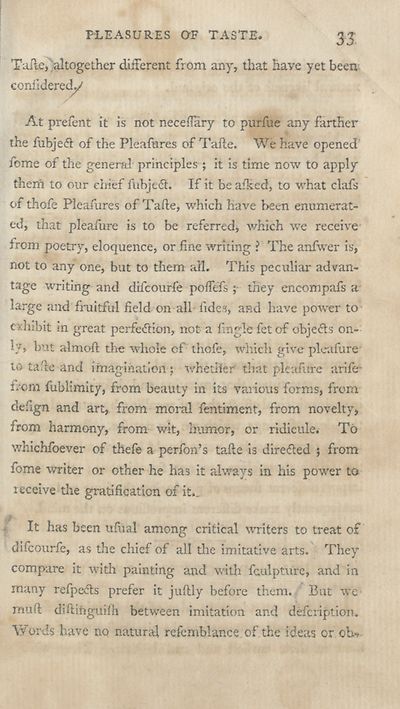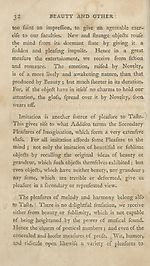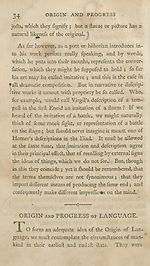Download files
Complete book:
Individual page:
Thumbnail gallery: Grid view | List view

PLEASURES OF TASTE.
Taite,'altogether different from any, tlrat have yet been
conlideredy
At prefent it is not neceflary to purfue any farther
the fubjeft of the Pleafnres of Tafte. We have opened
feme of the general principles; it is time now to apply
them to our chief fubjedt. If it be afked, to what clafs
of thofe Pleafures of Tafte, which have been enumerat¬
ed, that pleafure is to be referred, which we receive
from poetry, eloquence, or fine writing ? The anfwer is,
not to any one, but to them all. This peculiar advan¬
tage writing and difcourfe poflefs ;■ they encompafs a
large and fruitfol field on all-fides, and have power to
exhibit in great perfedfion, not a fingle fet of objedts on¬
ly, but almoft the whole of thofe, which give pleafure
to tafte and imagination; whether that pleafure arife-
from fublimity, from beauty in its various forms, from
defign and art, from moral fentiment, from novelty,
from harmony, from wit, humor, or ridicule* To
whichfoever of thefe a perfon’s tafte is diredted ; from
fome writer or other he has it always in his power to
teceive tire gratification of it..
f It has been ufual among critical uniters to treat of
difcourfe, as the chief of all the imitative arts. They
compare it with painting and with fculpture, and in
many refpedts prefer it juftly before them. / But we
muft diftihguifh between imitation and defeription.
Words have no natural refemblance of the ideas or oh-,
Taite,'altogether different from any, tlrat have yet been
conlideredy
At prefent it is not neceflary to purfue any farther
the fubjeft of the Pleafnres of Tafte. We have opened
feme of the general principles; it is time now to apply
them to our chief fubjedt. If it be afked, to what clafs
of thofe Pleafures of Tafte, which have been enumerat¬
ed, that pleafure is to be referred, which we receive
from poetry, eloquence, or fine writing ? The anfwer is,
not to any one, but to them all. This peculiar advan¬
tage writing and difcourfe poflefs ;■ they encompafs a
large and fruitfol field on all-fides, and have power to
exhibit in great perfedfion, not a fingle fet of objedts on¬
ly, but almoft the whole of thofe, which give pleafure
to tafte and imagination; whether that pleafure arife-
from fublimity, from beauty in its various forms, from
defign and art, from moral fentiment, from novelty,
from harmony, from wit, humor, or ridicule* To
whichfoever of thefe a perfon’s tafte is diredted ; from
fome writer or other he has it always in his power to
teceive tire gratification of it..
f It has been ufual among critical uniters to treat of
difcourfe, as the chief of all the imitative arts. They
compare it with painting and with fculpture, and in
many refpedts prefer it juftly before them. / But we
muft diftihguifh between imitation and defeription.
Words have no natural refemblance of the ideas or oh-,
Set display mode to:
![]() Universal Viewer |
Universal Viewer | ![]() Mirador |
Large image | Transcription
Mirador |
Large image | Transcription
| Antiquarian books of Scotland > Languages & literature > Abridgement of lectures on rhetoric > (49) |
|---|
| Permanent URL | https://digital.nls.uk/135467042 |
|---|
| Description | Thousands of printed books from the Antiquarian Books of Scotland collection which dates from 1641 to the 1980s. The collection consists of 14,800 books which were published in Scotland or have a Scottish connection, e.g. through the author, printer or owner. Subjects covered include sport, education, diseases, adventure, occupations, Jacobites, politics and religion. Among the 29 languages represented are English, Gaelic, Italian, French, Russian and Swedish. |
|---|

